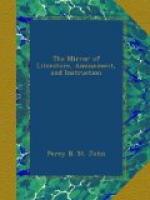the street, when the latter again insulted him.
This was immediately resented by the former, who inflicted
severe corporal chastisement on the latter. The
grand duke refused to interfere in the affair.
A trial ensued, in which some abuses of the president
were exposed, and Janiszewski sentenced only
to forty days’ imprisonment. This affair,
and this decision, created a strong sensation at the
time; and emboldened the commission appointed to investigate
the affairs of the town-house to insist on their rights.
The commission, being at length roused by the numerous
abuses that were pressed on their attention, obtained
an order from the minister of the interior to proceed
in the execution of their duties. They immediately
formed themselves into branch committees, each two
taking cognizance of a department. The task of
investigating the abuses in the quartering of the
officers devolved on two citizens, called Schuch
and Czarnecki. They found, on inquiry,
that the owners of large houses were induced to compromise
with the billetmaster for a sum in cash equal to one-fourth,
and in some instances to one half of the amount of
rent, in lieu of having a general or any number of
inferior officers quartered on them. In Warsaw
many of the houses contain from fifty to a hundred
families; consequently, the billet-compensation money
was a grievous tax. The mass of extortions were
found to exceed in reality any previous estimate.
A new scene now opened to view. Those gentlemen
received evidence that the Russian generals were
participators in the pillage of the town, and in
league with the president and billet-master. Feeling
that they should be detected in proceedings so disgraceful,
they consulted a lawyer (Wolinski,) to know
if the researches of the committee could not be legally
prevented. His opinion was given in the negative;
but, in order to divert the public mind from the investigation,
he advised Czarnecki to provoke one of the
commission to strike him, when he should be able to
prosecute him for attacking an employe and by
that means get rid of the investigation. Czarnecki
used the most insulting language to Mr. Schuch, and
in a fit of desperation seized hold of his arm, with
the intention of putting him out of the room by force.
The committee-man being on his guard, the manoeuvre
failed. Czarnecki, seeing himself foiled, his
iniquity discovered, and his ill-gotten wealth likely
to be confiscated, committed suicide, and thus left
the president and generals to fight their own battles.
The artillery of Messrs. Schuch and Czarnecki
was now directed against the whole of the Russian
and two Polish generals, the notorious and unprincipled
Raznieki, the head of the secret police of the
kingdom, and Kossecki. Means had in vain
been tried to bribe Messrs. Schuch and Czarnecki
through the commissary of the circle, that the investigations
should cease, or that the generals should not appear




